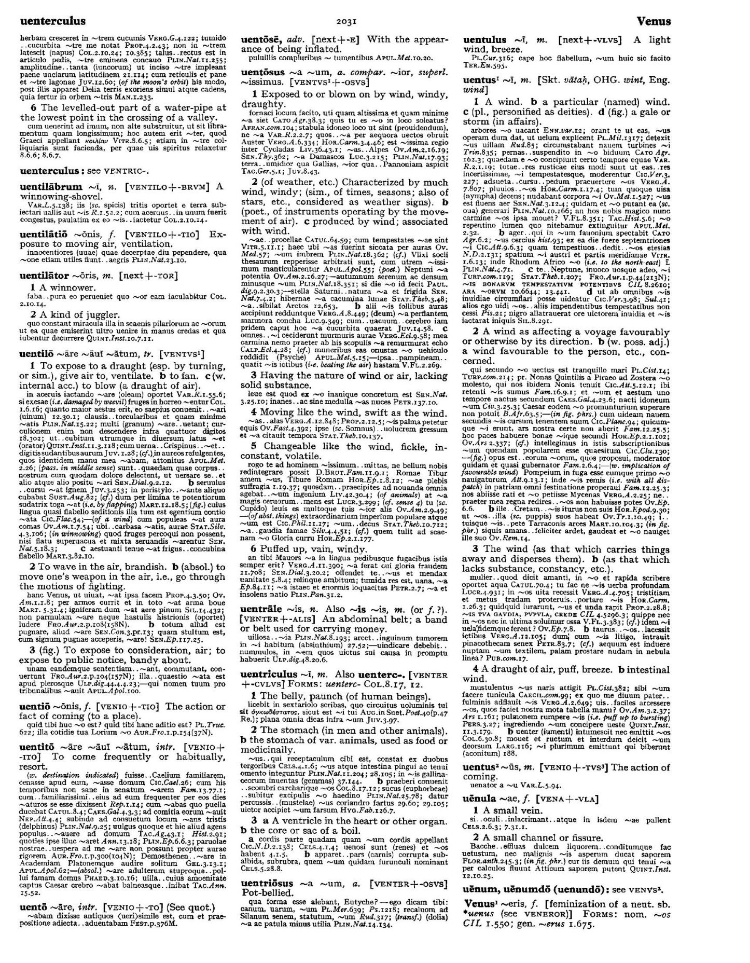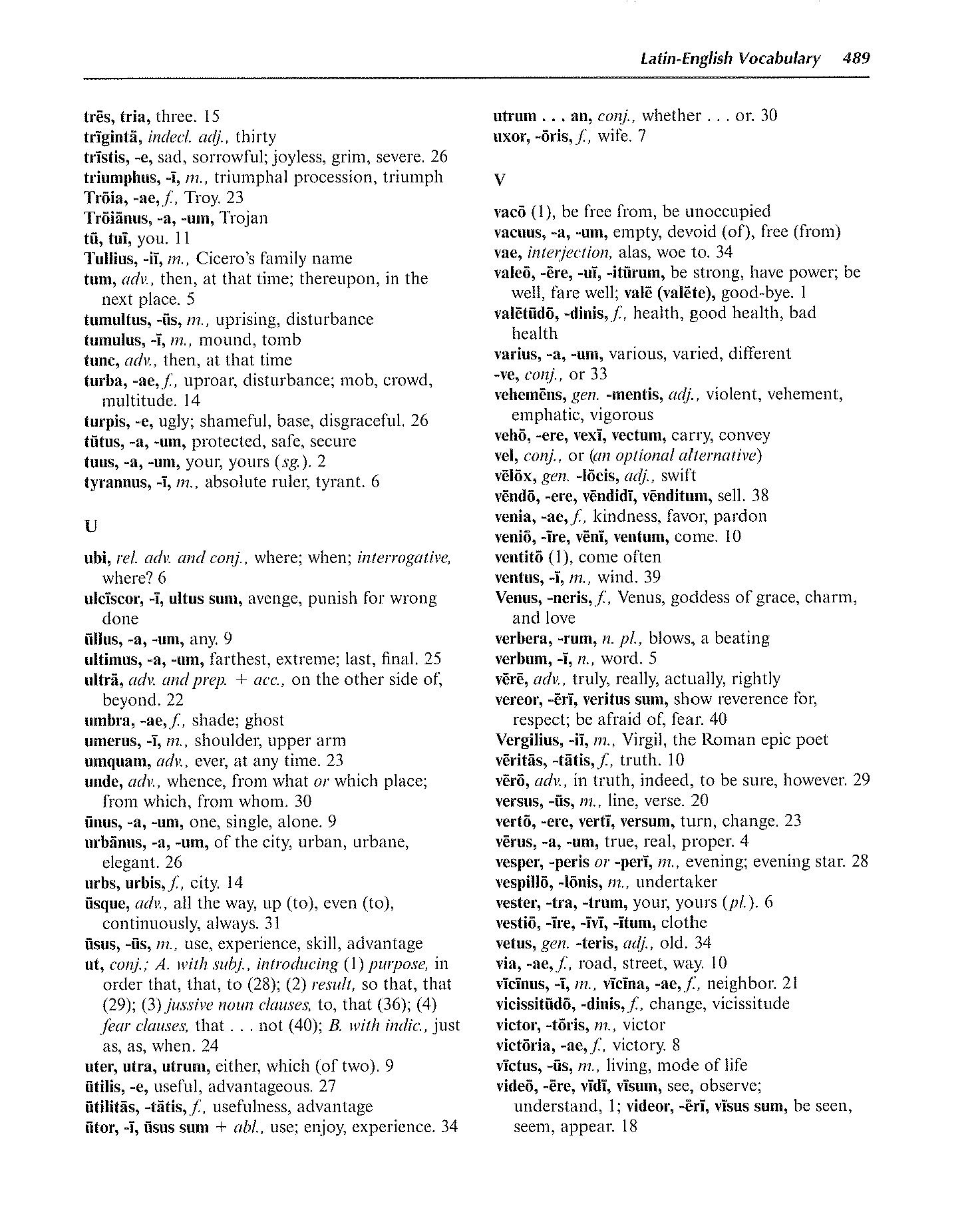
page_listing.tpl
page_subListingDetails.tpl
sub_listingDetails_style1.tpl
sub_listingDetails.title.tpl
Venus Venus, goddess of love
Venus is a Latin Noun that primarily means Venus, goddess of love.
Definitions for Venus
Wheelock's Latin
Noun
- 1
Venus, goddess of grace, charm, and love
Oxford Latin Dictionary
Noun
- 1
A goddess of Italian origin, identified by the Romans with Aphrodite, and this goddess of sexual love and generation; in mythol., mother of Aeneas. (b) (transf., of a woman who inspires love in one). (c) ( in refs. to Julius Caesar, who claimed descent from her through Aeneas).
- 2
(applied to, or used in the names of, var. things associated with the goddess Venus): (a) The planet Venus; also stella, siddus ~eris. (b) the best throw in dicing with tali, when each of the four shows a different face. (c) aues, ~eris. doves. (d) pecten ~eris, a plant, perh. shepherd's needle, Scandix pectenveneris; labrum ~eris, the teasel. (e) ~eris crines, a precious stone; see quot. (f) portus ~eris, a harbour in Gallia Narbonensis at the Mediterranean end of the Pyrenees (mod. Port Vendres).
- 3
The quality of attracting sexual love, charm. (b) (without sexual connotation) charm, grace.
Sentences with Venus
Latin to English
Sine Cerere et Baccho friget Venus.Compare Without Cere and Bacchus, Venus freezes. (meaning: without bread and wine, love freezes)
Lais anus Veneri speculum dedico; dignum habeat se aeterna aeternum forma ministerium. at mihi nullus in hoc usus, quia cernere talem, qualis sum, nolo, qualis eram, nequeo. (De Laide dicante Veneri speculum suum. Epigrammata, LXV)Compare I, the aged Lais, dedicate my mirror to Venus; let eternal beauty receive the eternal tribute it deserves. The mirror is no longer of any use to me, for I do not want to see myself as I am, and I cannot see myself as I was.
Utque viro furtiva Venus, sic grata puellae. Vir male dissimulat; tectius illa cupit.Compare And as stolen love is pleasant to a man, so it is also to a woman; the man dissembles badly; she conceals desire better.
Armat spina rosas, mella tegunt apes. crescunt difficili gaudia iurgo accenditque magis, quae refugit, Venus. quod flenti tuleris, plus sapit osculum. [Fescennina de nuptiis Honorii Augusti, IV,10]Compare Thorns arm the rose and bees find a defense for their honey. The refusals of coyness do but increase the joy; the desire for that which flies us is the more inflamed; sweeter is the kiss snatched through tears.
Aeneadum genetrix, hominum divomque voluptas, alma Venus, caeli subter labentia signa quae mare navigerum, quae terras frugiferentis concelebras, per te quoniam genus omne animantum concipitur visitque exortum lumina solis. [De Rerum Natura,I,1]Compare Mother of Aeneas and his race, darling of men and gods, nurturing Venus, who beneath the smooth-moving heavenly signs fillest with thyself the ship-bearing sea and the fertile earth, since through thee every generation of living things is conceived and rising up looks on the light of the sun. [Tr. W. H. D. Rouse]
Non fero Romanum nomen sudataque bella et titulos tanto quaesitos sanguine carpi. detrahit invictis legionibus et sua Romae praemia deminuit, qui, quidquid fortiter actum est, adscribit Veneri, palpam victoribus aufert. [Contra orationem Symmachi,II,551)Compare I will not permit the name of Rome, whose wars cost so much toil, and whose glory was purchased at such cost of blood, to be disparaged. He who credits Venus with Rome's great exploits belittles the unconquered legions, destroys Rome's honor, takes away the palm from the victors.
Nominibus mollire licet mala, fusca vocetur nigrior Illyrica cui pice sanguis erit. Si Paeta est, Veneri similis. Si flava, Minervae, sit gracilis macie quae male viva sua est. dic habilem quaecumque brevis; quae turgida, plenam; et lateat vitium proximitate boni.Compare With names you soften shortcomings; let her be called swarthy whose blood is blacker than Illyrian pitch; if cross-eyed, she is like Venus; yellow haired, like Minerva; call her slender whose thinness impairs her health; if short, call her trim; if stout, of full body; let its nearness to a virtue conceal a fault.
Data sources
Notes
- Definitions
- Frederick M. Wheelock, Wheelock's Latin, 6th ed., rev. Richard A. LaFleur (New York, NY: HarperCollins Publishers, 2005): 489.
- P. G. W. Glare, Oxford Latin Dictionary, Vols. 1-8 (Oxford: Clarendon Press, 1982): 2031.
- Word frequencies
- Paul B. Diederich, The Frequency of Latin Words and Their Endings, PhD diss., (Columbia University, 1939).
Bibliography
Allen, Joseph H. Allen and Greenough's New Latin Grammar for Schools and Colleges: Founded on Comparative Grammar. Edited by James B. Greenough, George L. Kittredge, Albert A. Howard, and Benjamin L. D'Ooge. Boston, MA: Ginn & Company, 1903.
Crystal, David. A Dictionary of Linguistics and Phonetics. 6th ed. Oxford, UK: Blackwell Publishing, 2008.
Delatte, Louis, Suzanne Govaerts, Joseph Denooz, and Etienne Evrard. Dictionnaire fréquentiel et index inverse de la langue latine [Frequency Dictionary and Inverse Index of the Latin Language]. Liège, Belgium: Laboratoire d'analyse statistique des langues anciennes de l'Université de Liège (L.A.S.L.A.), 1981.
Diederich, Paul B. The Frequency of Latin Words and Their Endings. PhD diss., Columbia University, 1939.
Francese, Christopher. "Latin Core Vocabulary." Dickinson College Commentaries. Last modified 2014. http://dcc.dickinson.edu/latin-vocabulary-list.
Gildersleeve, Basil L., and Gonzales Lodge. Gildersleeve's Latin Grammar: Third Edition, Revised, and Enlarged. 3rd ed. London, England: Macmillan and Co., 1903.
Glare, Peter G.W. Oxford Latin Dictionary. Vols. 1-8. Oxford, England: Clarendon Press, 1982.
Krüger, Bernd. "Latin Conjugation Tables." Cactus2000. Accessed May 5, 2023. https://latin.cactus2000.de/index.en.php.
Pierson, Nick. "Sound of Text." Accessed October 26, 2019. https://soundoftext.com.
Wheelock, Frederick M. Wheelock's Latin. 6th ed. Revised by Richard A. LaFleur. New York, NY: HarperCollins Publishers, 2005.
Wiktionary Contributors. "Victionarium." Wikimedia Foundation, Inc. Updated March 18, 2019. https://la.wiktionary.org/wiki/Victionarium:Pagina_prima.
Citation
Chicago (17th ed.)
Allo Contributors. "Venus, Veneris (n.) - Latin Word Definition." Allo Latin Dictionary. Last modified . Accessed February 19, 2026. http://ancientlanguages.org/latin/dictionary/venus-veneris.
Entry created on . Last updated on .








